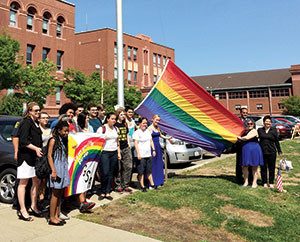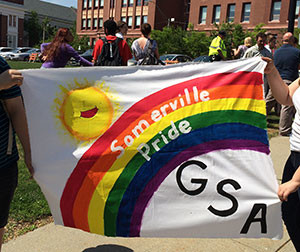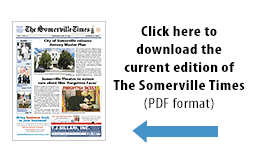
Members of the public joined with officials for the raising of the rainbow flag last week, signifying solidarity among all Somerville residents with the LGBTQ community.
By Patrick McDonagh
A crowd of students, community members, state and city officials gathered to raise a rainbow flag on the City Hall concourse last Wednesday. Proudly posing for a photo, the colorful flag was pulled taught by Somerville’s Mayor Joe Curtatone, Student Gay-Straight Alliance (GSA) member Sam Williams, and Somerville’s LGBTQ community liaison Andra Oshinsky; all taking the podium to address attendees in support of the LGBTQ flag raising.
Bated tears hidden behind Sam Williams’ pink heart shaped sunshades proved affirmation to Mayor Curtatone’s introduction: “Being here is more than just raising a flag. It’s the symbolism. Raising the flag expresses unity, it expresses community love for one another, and for the choices people make.”
The flag raising took place four days prior to the congressionally recognized Lesbian, Gay, Bisexual, Transgender (LGBT) pride month of June. GSA leaders in the Somerville High School community and LGBTQ supporting attendees were invited to help raise the symbolic rainbow insignia, where it will fly on the concourse’s flagpole as a representation of unity regarding the often-contentious civil rights issue.

~Photos by Patrick McDonagh
LGBTQ Community Liaison Andra Oshinsky described major victories in Somerville High School and schools state wide regarding gender identity issues. “LGBTQ students are coming out and schools are rallying around these students,” Oshinsky said, “making sure they [school boards] revise their policies and practices to ensure that students are supported. A big thing that’s going on in the city of Somerville and across Massachusetts is that there is a real effort school wide to support students around gender identity issues.” As a self-Identifying Queer individual throughout a college career at Northeastern University, community and LGBTQ relations is of vested interest. Oshinsky’s University degree in public advocacy is in full use as an advocate for Somerville, whereas in her childhood community her sexual identity was stifled.
“Growing up in a suburb of Baltimore, I didn’t necessarily have role models who represented the full spectrum of the Queer community,” Oshinsky shares. “There weren’t always words to match up to how I saw the world and how I felt about myself.” Oshinsky is currently active in the greater Boston LGBTQ community, acting as role model for younger individuals realizing their sexuality. Somerville High School junior and GSA member Sam Williams is one of these individuals. Williams and Oshinsky share similar sentiments regarding how their sexuality is perceived in Massachusetts and the Somerville community. “It was really wonderful to come to the Boston area,”Oshinsky said. “It is pretty liberating to use a label when you want to use a label. I was really grateful for that.” Williams currently identifies as a bisexual high school student; an identity she is able to realize with social support in her home state of Massachusetts.
Williams’ confident willingness to interpret, understand, and share her sexual identity is testament to a progressive LGBTQ social climate in the Boston area. Political figures and state representatives rallying around sexual or gender identification certainly alleviate difficulty of coming out. State representatives Denise Provost and Christine Barber joined the flag raising to show support and promote this acceptance.
Legislation in Massachusetts set the early standard for gay lesbian civil rights, but there is catching up to do, Rep. Provost explains why: “Back in 2011 the legislature enacted and the governor signed a bill that provided some protection to transgender people in Massachusetts. It added transgender status to the hate crime statute, and it protected the access of transgender people to employment, credit, education, and housing. As a political compromise the access of transgender people to public accommodations, streets sidewalks, transit, public buildings, hospitals, clinics, places that people go, were all cut out of the bill.”
Provost discussed the bill in submission (Bill H.1577 An Act relative to gender identity and nondiscrimination) that would widen the umbrella coverage of legislative civil rights; further including “gender identity” in relation to transgender or alternative identifications of gender. Somerville, Boston, Cambridge, and a dozen other Massachusetts communities have a local ordinance or bi-law that guarantees equal access for transgender people.
Public guarantee of accommodation for community members is a priority for Rep. Provost and constituents in support of the bill. “It is essential to any kind of civil rights,” Provost said. “Most of the civil rights movements of the 60s were about giving people the right to sit down at a lunch counter, not to have to sit at the back of the bus. Without access to public accommodations there is not really equal access under law.” Civil servants involved in LGBTQ equality are leaders priming further community involvement from young activists, according to Provost.
Members of the community with LGBTQ related issues, questions, or concerns are urged to contact Andra Oshinsky. For more information about the GSA and other LGBT programming, events and information, contact lgbtq@somervillema.gov, or 617-625-6600 ext 2400.















Reader Comments